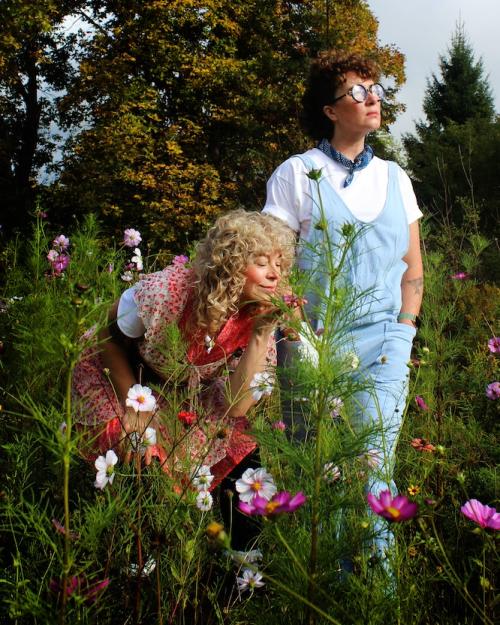Two brilliant tween sisters leave civilization for the mysterious woods in the play “Rosa and Blanca,” a darkly funny fairy tale “very much not for children,” that will be performed at Ithaca’s Cherry Arts Nov. 8-17. Cornell’s Department of German Studies in the College of Arts and Sciences (A&S) is planning some collaborative events.
“Rosa and Blanca” playwright Rebekka Kricheldorf will discuss her work with Samuel Buggeln, the play’s director and artistic director of Cherry Arts, on Nov. 12 at 5 p.m. in Goldwin Smith Hall Room 258, in an event organized by German studies and co-sponsored by the Departments for Performance and Media Arts and Comparative Literature, as well as the Institute for German Cultural Studies. Their conversation, which will be in English, is open to the public.
“Rebekka Kricheldorf is one of the foremost dramatists in Germany, and she is an especially astute writer and thinker of the comic and comedy,” said Elke Siegel, associate professor of German studies and department chair (A&S). “What’s particularly engaging about Kricheldorf’s work is her rigorous and humorous way of working through stereotypes and clichés and her use of the comic to deconstruct popular texts like the Grimm fairy tales. In fact, ‘Rosa and Blanca’ is a rewriting and revision of the Grimm tale ‘Snow-White and Rose-Red,’ the story about two very close, but very different sisters.”
There is no happy ending in Kricheldorf’s version of the tale, Siegel said. Rather, it is a comical and a dark story about female friendship, the blindness of love and thwarted hopes for a different life.
Kricheldorf, who lives in Berlin, has created more than 40 new and translated theater works. She was in-house author at Nationaltheater Mannheim/Germany in 2004 and artistic director and in-house author at Theaterhaus Jena/Germany, 2009-2011. She published her first novel, “Lustprinzip” (Pleasure Principle) in 2021.
“Rosa Und Blanca” premiered in 2006, commissioned by Staatstheater Kassel, Germany. This will be its first professional production for an English-language audience.
The Cherry Arts, a theater and multi-arts company, produced the U.S./ English premier of Kricheldorf’s 2012 play “Testosterone” in 2019. The production was a success, Buggeln said, setting a box office record for the Cherry. For that production, too, Cornell’s Department of German Studies created opportunities to connect with Kricheldorf and her writing.
“The Cherry has been premiering international plays in English for almost a decade, and we’ve been so delighted by Cornell’s German Department and their enthusiasm for bringing contemporary German artists into conversation with their students,” Buggeln said. “Rebekka is one of Germany’s great comic theater writers, and – perhaps in characteristic German style – her comedy is anything but light. Rather it’s a quite pointed tool to searchingly explore tough ethical and philosophical questions. There’s nothing faint-hearted about it.”
Three Cornell students are working with Cherry Arts this semester through the Einhorn Center for Community Engagement work-study program, contributing to facets of the production from administrative and management to research and the box office.
On Oct. 17, members of the German Drama Reading Group, including undergraduate students, graduate students and faculty, came together to read the play out loud in the original German, an event coordinated by Gunhild Liscke and Amparo Necker, graduate students in comparative literature (A&S). (Liscke is also director of undergraduate studies and language program director for German studies.)
A group of undergraduate and graduate students and faculty will attend the Nov. 8 premier together. Kricheldorf plans to visit a German language class, Perspectives on German Culture, on Nov. 11.
“The performance without a doubt will bring a live piece of Germanophone culture to Ithaca and Cornell, fostering a network of transnational connection and collaboration,” Siegel said.





